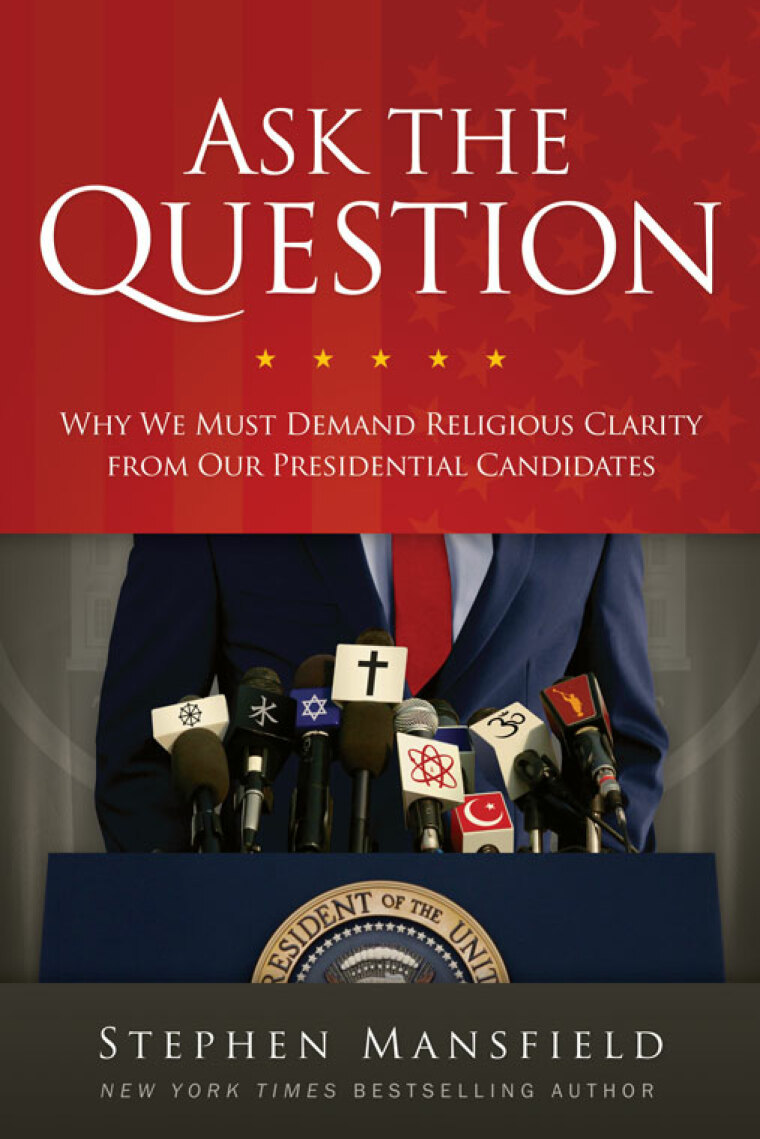Trump, Clinton, Cruz not asked enough about their faith by press, author Stephen Mansfield says

WASHINGTON (Christian Examiner) – Some political pundits say religion is discussed too much in political life. Author Stephen Mansfield says it's not discussed enough – at least, not in the ways it needs to be.
[Ninety] percent of Americans believe in God, so let's stop acting like religion is some odd thing that is superglued onto an otherwise good person's life.
The New York Times bestselling author has a new book, "Ask the Question," (Baker) that urges the press to take religion more seriously during the presidential race, beginning by asking the candidates specific questions about how faith shapes their positions and policy.
As it stands now, Mansfield says, religion is either completely ignored or only used by the press as a way to criticize conservatives for holding to supposedly "outdated" positions. Both approaches are wrong, he says.
"The Constitution forbids religion tests, and we don't want a candidate for high office, a candidate for the presidency, to have to take a written exam to confirm they are orthodox in one direction or the other," Mansfield told the Christian Examiner. "On the other hand, I quote in the book the Founding Fathers where they specifically say: We expect the people to pay attention to the religion of the candidates. We're simply doing what the Founding Fathers expected the whole country to do."
Mansfield is the author of some 20 books, including "The Faith of George W. Bush" and "The Faith of Barack Obama."
A Pew Research Center survey earlier this year found that 51 percent of Americans and 64 percent of Republicans prefer a candidate who shares their religious beliefs. Additionally, 40 percent of Americans said political leaders talk "too little" about their faith, while only 27 percent said political leaders talk "too much" about it.
The Christian Examiner recently spoke with Mansfield about the 2016 election and what he thinks the press gets wrong about religion. Following is a transcript, edited for clarity:
Christian Examiner: What led you to write this book?
Stephen Mansfield: The short answer is that I decided to make a point I had been making for eight years in a more direct way. I wrote the "Faith of George W. Bush" years ago, and I made the point in that book that if a politician's or candidate's faith is sincere, it's the most important thing about him. It definitely tells us how they're going to lead. I made the same point again in the "Faith of Barack Obama." As I saw this [2016] presidential election shaping up, I realized that a lot of people think we're heading into a secular direction, but nothing could be further from the truth. This election is shaping up to be as faith-based as any in American history.
CE: Why should we care about a candidate's faith?
Mansfield: If we're going to vote, we're going to care about anything that affects what they do in office. If our assumption is that religion is just window dressing and that it never affects their public life, then we shouldn't care. But we have lots of examples throughout American history that confirms that what a president does believe religiously has a dramatic effect on what they do in office. It's not to go after a certain religion, but it's simply as a way to say, 'If you are saying you're faith-based, then we need to know how that will shape you in office,' because it affects the direction of our country. They can have their faith, and I'm thrilled for it. I just want to know what it is.
CE: Some Christians will appreciate what you're book is saying, but they get a little nervous when what they view as a hostile media begins picking apart conservative Christian beliefs. How do we tackle this subject without it turning into an attack on Christianity?
Mansfield: I certainly share that concern. But my book is written not only to voters but also to the press. And I am saying: Look, you in the media are not very versed when it comes to religion. You tend to treat religion as an oddity of someone's life, and it's time to realize that religion has a profound effect on not just on the Right but at every level. Frankly, Hillary Clinton is saying nothing different about the influence of religion on her life than Jerry Falwell said. There's deep concern that the press picks at religion, and particularly conservative religion. The press is definitely part of the problem – not only in their not educating themselves well but also that they're not reporting on religion as anything other than like a carnival freak show.
CE: Has there been a time in American history when this issue was covered appropriately?
Mansfield: Yes, and for a good portion of our early history – really up to the 1800s – religion was covered with respect. It was assumed that candidates had a faith. There might be some discussion and debate about their denomination. You'd have articles about whether they were tithers or whether they had ever served as an elder in their church. That started to change when you began to have more or a progressive and anti-religious orientation in the early 1900s.
CE: What is the solution?
Mansfield: The solution involves at least two things. First of all, that we ask the question. For example: Mrs. Clinton, you say that you are faith-based, and you say you are particularly faith-based when it comes to your immigration policy. Would you draw the line between some tenant of your faith — a Scripture, a cardinal doctrine of the Methodist church — and what you believe about immigration? Second, that the press starts treating it as what it really is; 90 percent of Americans believe in God, so let's stop acting like religion is some odd thing that is superglued onto an otherwise good person's life.